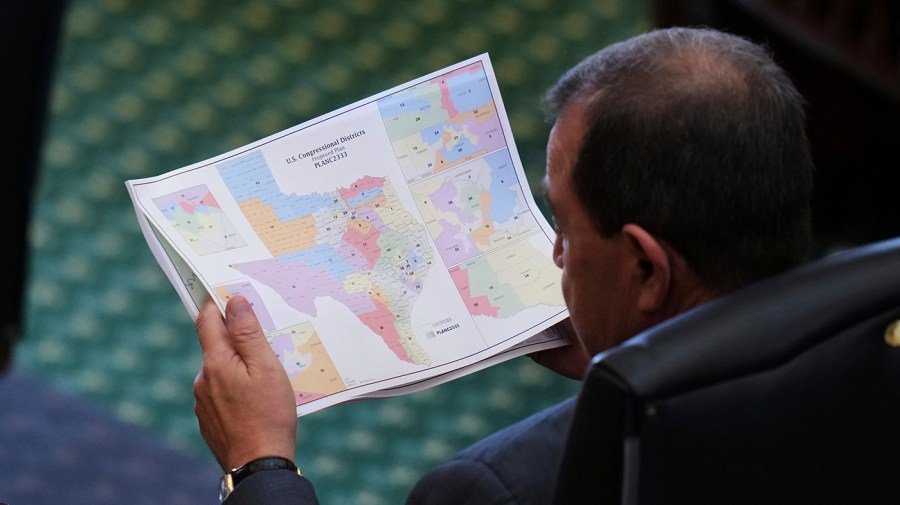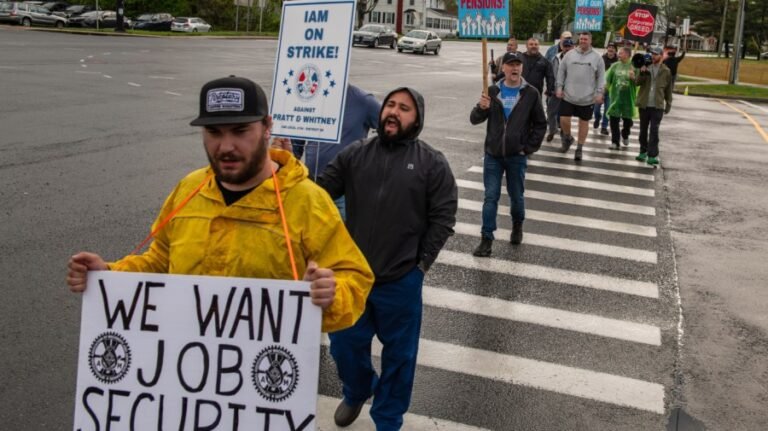
Americans are broadly opposed to political gerrymandering, but polls show even Democrats are coming around to the idea as the redistricting battle between the parties has intensified over the summer.
Polling shows voters across the spectrum view gerrymandering with distrust and support limits on politicians being able to draw the lines to help their side. But in practice, members of both parties are becoming more open to their states responding to others’ efforts to capitalize on the process.
“You can have these views, and they seem opposed, but they’re not totally inconsistent,” said Alexander Rossell Hayes, a senior data scientist for YouGov. “It kind of makes sense, in a way, for someone to say, ‘I think gerrymandering should be banned at the national level. If it’s not going to be banned at the national level, and other states are doing it, we’ve got to do it too.’”
Although the practice is common in red and blue states, partisan gerrymandering regularly polls poorly among voters on both sides of the aisle.
That sentiment among Democrats led to the spread of independent commissions that a number of blue-leaning states set up in the 2000s and 2010s to handle redistricting in a nonpartisan way.
A YouGov poll from early August showed half of American respondents disapproved of Texas drawing more Republican-leaning House districts, including 40 percent who said they strongly disapprove. Two-thirds of Republicans said they were at least somewhat on board with the plan, but it didn’t receive much support elsewhere.
More than 30 percent overall said they support Texas’s action, and only 16 percent said they strongly approve.
A Reuters/Ipsos poll taken after paints a similar picture, with 55 percent saying redrawing districts to win more seats in the House is bad for democracy, while only 18 percent said it isn’t. Those who said it hurts democracy include more than 70 percent of Democrats, a majority of independents and a plurality of Republicans.
Alec Tyson, a senior vice president of public affairs for Ipsos, said GOP opposition to gerrymandering is more modest than that of Democrats, which he attributed in part to some voters looking to cues from their leaders. President Trump and other Republicans like Texas Gov. Greg Abbott have called for their party to try to pick up seats through redistricting.
“Certainly, that has some effect on a segment of the Republican Party, and I think that’s part of what you see in the attitudes among Republicans,” said Tyson, who noted that Republicans still largely view gerrymandering as wrong.
Resistance to gerrymandering could also pose a challenge for California Gov. Gavin Newsom (D) as he advocates for a ballot measure that could allow the state government to go around its independent commission and redraw its lines for the rest of the decade.
A Politico-Citrin Center-Possibility Lab survey found just more than a third of Californians polled said they support returning redistricting authority back to the state Legislature, with nearly two-thirds opposed.
Those opposed included 9 in 10 Republicans, 8 in 10 independents and even half of all Democrats.
The results came as Newsom vowed to go forward with the ballot measure to respond to Texas.
But another poll released a week later, from the University of California, Berkeley Institute of Governmental Studies, showed 48 percent said they supported the ballot measure that could create more Democratic-held seats in the House. A third said they opposed it, and 20 percent were undecided.
Eric Schickler, the co-director of the institute, said one key difference between the two polls is that the first one didn’t specify that the proposal from Newsom is temporary, while the institute’s made clear that it would only be in place for the 2026, 2028 and 2030 elections but revert back to the commission after.
He said the language of the measure is critical in getting voters to be more open to it.
“I think what it suggests is, when the issue is framed as a temporary response to Texas, California voters are more willing to go along with it than if it were, ‘We’re going to permanently do away with the redistricting commission and give the legislature this power no matter what,’” Schickler said. “I think it’s fair to say if Newsom put that on the ballot, there’s a very good chance it would fail.”
Schickler, who is also a political science professor at the University of California, Berkeley, said he’s interested to see if Republicans being more aggressive on redistricting causes a broader shift among Democrats in their attitudes about gerrymandering. But he said Newsom’s strategy of this being a temporary move suggests he’s not “eager” to go in that direction now.
Another poll from YouGov released Wednesday indicated more support for redrawing the lines at least in response to other states acting first.
Support for Democrats redrawing districts to help themselves if Texas does it first rose among all adults from 24 percent earlier in August to 31 percent. The percentage of Democrats supporting a response rose from 40 percent to 53 percent, and support among independents jumped up 10 points.
Support for states to redraw their lines in response to California’s own moves also rose, up 8 points among adults, 5 points among Republicans and 8 points among independents.
Hayes said the biggest shift that Ipsos has observed is in favor of “conditional gerrymandering,” acting if another state does first. He said a majority of people in all parties say they believe gerrymandering is unfair and should be illegal, but they’re more open to it as part of a “tit for tat.”
One exception may be Indiana, which has at least so far seemed to chart its own path in not yet getting swept up in the redistricting battle.
Several GOP state lawmakers have expressed skepticism about redistricting despite pressure from the Trump administration.
A poll from the left-leaning firm Change Research found half of Indiana respondents were opposed to redrawing the state’s map while a third were in favor. More than 80 percent said they believe redistricting should be done in a balanced, fair way, while only 20 percent said the majority should be able to redraw the lines in a way to benefit Republicans because Indiana is a Republican state.
More than two-thirds of Republicans agreed with the former.
With the White House pressuring Indiana to redistrict and some lawmakers softening their opposition to it, it’s uncertain whether the state will go forward. But Ben Greenfield, a senior analyst for Change Research, said he expects some amount of opposition to remain regardless.
“The fact that people have been hearing about this issue and have been hearing about it from leaders of their own party and the needle has still not moved towards hyperpolarization, suggests that there will likely continue to be some degree of pushback, even from Republicans on this,” he said.
Hayes said one finding from both YouGov’s first and second surveys was most voters saying they don’t want districts that just favor their own side but are competitive.
“Even among partisans, people are telling us that they’d rather have a competitive election,” he said. “It seems that there is some contingent, which right now is mostly among Democrats, who are resigning themselves to say, ‘If it’s going on, we got to fight just as hard. But I’d really rather this wasn’t going on at all.’”


